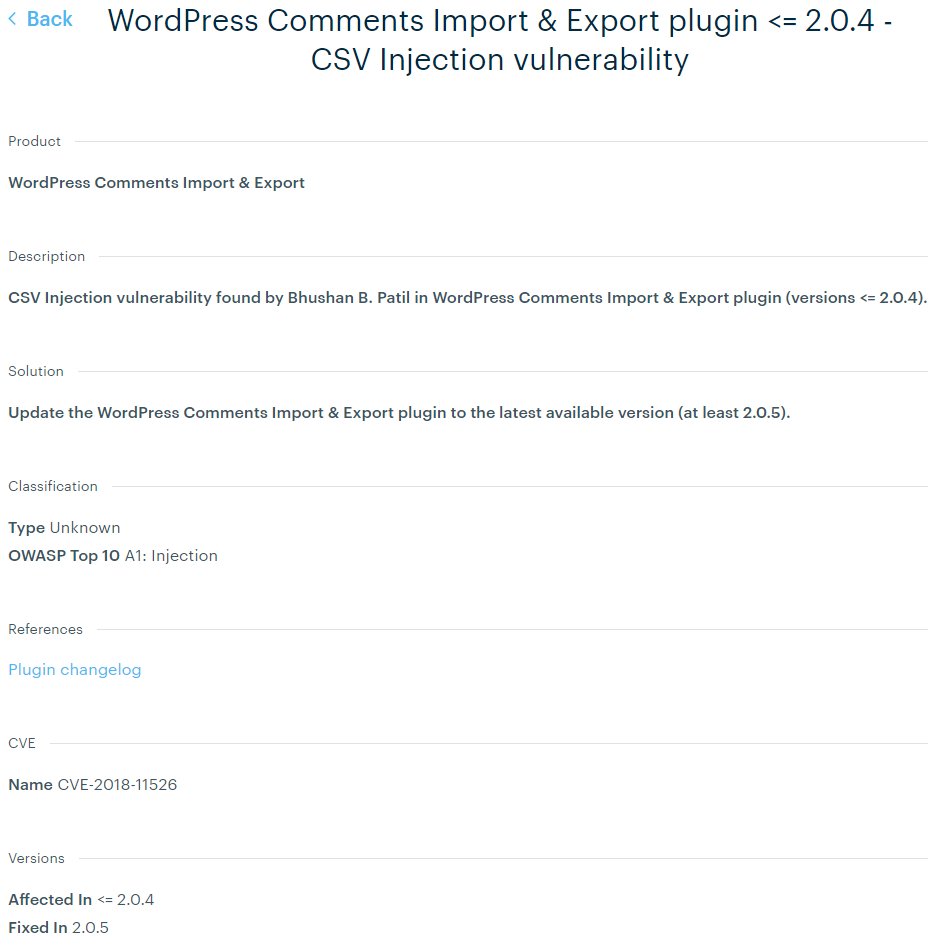Other Data Sources on WordPress Plugin Vulnerabilities Belatedly Add Vulnerability While Falsely Claiming It Has Been Fixed
When it comes to the problems with the security industry one of the fundamental issues is the abundance of false and misleading claims about the capabilities of products and services. The breadth of that is on display in how often that occurs with our little piece of the industry, data on vulnerabilities in WordPress plugins, where among other issues you have a company falsely claiming their data set contains all known vulnerabilities despite actually not even adding the most vulnerabilities and Wordfence claiming the data they use only contains “Confirmed/Validated” vulnerabilities. On that latter front we recently came across another example of other data sources falsely claiming that a vulnerability had been fixed, when it hadn’t. Getting that right seems like a critical element in providing this type of data, since correctly informing about unfixed vulnerabilities seems like it would the most important element. This time it involves a vulnerability that we were warning our customers for a month before the other data sources even added to their data set.
One of the things we do to make sure we provide the most complete data on vulnerabilities in WordPress plugins is to monitor for indications that a new version of a plugin includes a fix for such a vulnerability. With version 2.0.5 of the plugin WordPress Comments Import & Export, which was released on May 7, originally one of the changelog entries was “Fix the vulnerable to Remote Command Execution.”. Minutes later it was changed to “Bug fix, comment data filtered.” We looked into that and found that there was a CSV injection vulnerability that was attempted to be fixed in that version, but the fix was incomplete. We then put out a post with the details of the vulnerability on May 17. We notified the developer of the plugin that the vulnerability had not been fixed then as well. On June 6 the changelog was modified again to add “CSV Injection was fixed – reported by one of our user (Bhushan B. Patil) CVE-2018-11526”.
While the details of our post on the vulnerability are only available to our customers, other data providers could have known a fair amount about the vulnerability with just the title of our post. The final version of the changelog would have also given them a lot to go on and yet they didn’t add the vulnerability until it was disclosed by the discoverer.
When the discoverer, Bhushan B. Patil, disclosed it, they incorrectly stated it had been fixed. That isn’t an uncommon situation. Despite that, other data sources just blindly repeated that it was fixed without checking things over.
Here is ThreatPress’ entry:
The most widely used data source, the WPScan Vulnerability Database, got things even more wrong since they claim it was fixed in version 2.0.4:
Proper Warning Missing
One key difference with those data sources and ours is that they are accessible for free, so there is a tradeoff to be made when using a free data source. If the lack of checking if vulnerabilities were fixed was the only limitation with those data sources, you could mitigate that by testing out if vulnerabilities in plugins you use have actually been fixed, but that isn’t only one of the issues with them. Another is that they are missing plenty of more important vulnerabilities than the one in WordPress Comments Import & Export from their data sets. Take for example an unfixed vulnerability in the plugin KingComposer that we discovered and had disclosed on May 16. That is a vulnerability that we have seen evidence that hackers are already trying to exploit, so it would be something that you would want to be warned about, but those data sources still don’t contain that vulnerability. Since we don’t want people to be left in the dark in that type of situation we includes the details of vulnerabilities that look like they are being exploited in the free data that comes with the companion plugin for our service, so even those not using our service can be warned.
Any providers using data sources like those should be providing proper warning about the quality issues that are inherent in the data they are using. Unfortunately that isn’t the case. Some even take it further. Earlier we mentioned how Wordfence claims that the data they use on plugin vulnerabilities is “confirmed/validated”, but there data is none other than the WPScan Vulnerability Database, which as this situation shows, doesn’t do that. Lying in that way seems like it should be a serious issue, but considering that Wordfence has a long history of serious lies like that, which haven’t impacted them so far, we unfortunately don’t think it will cause them any damage.

